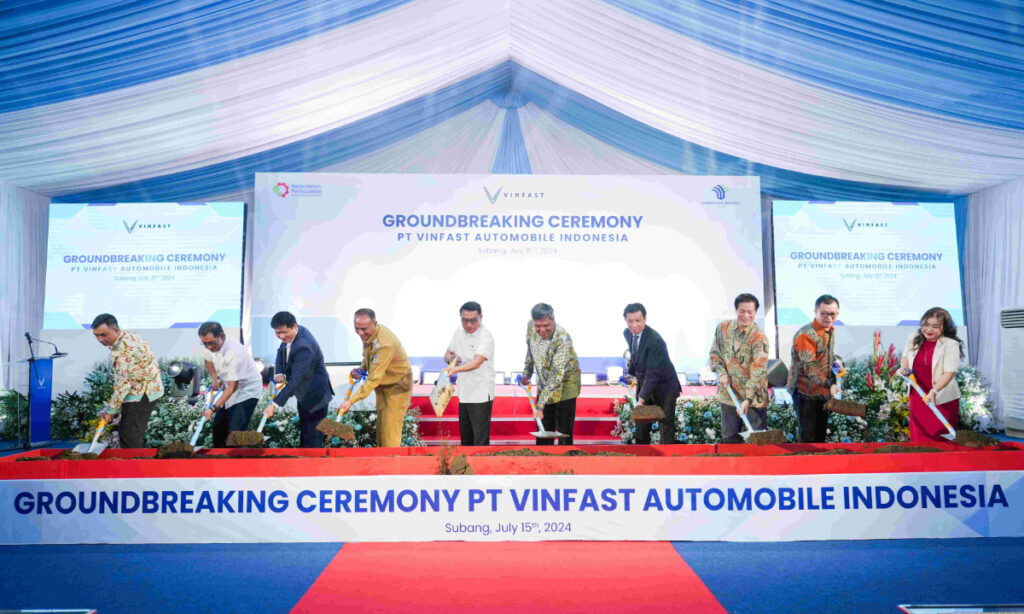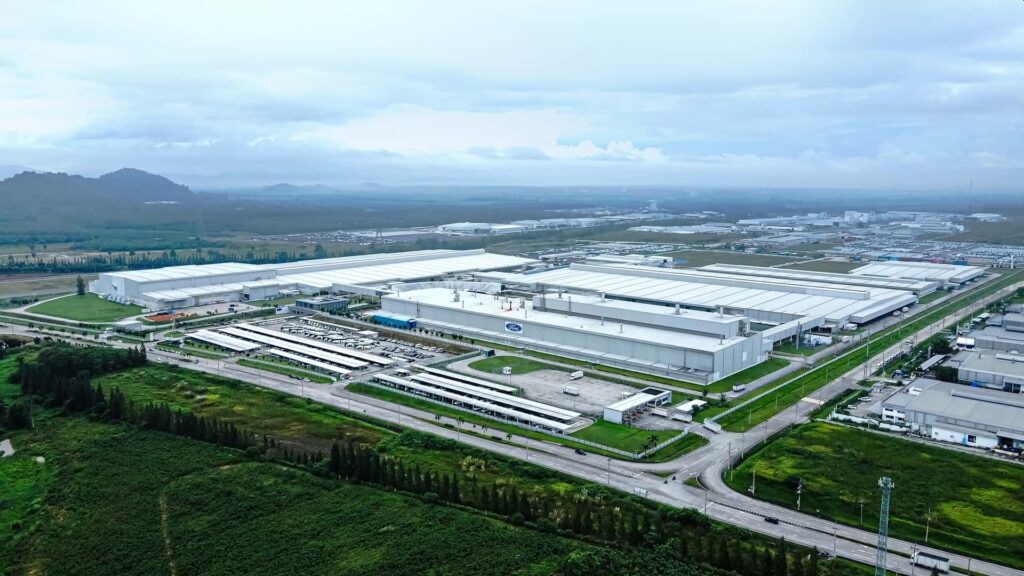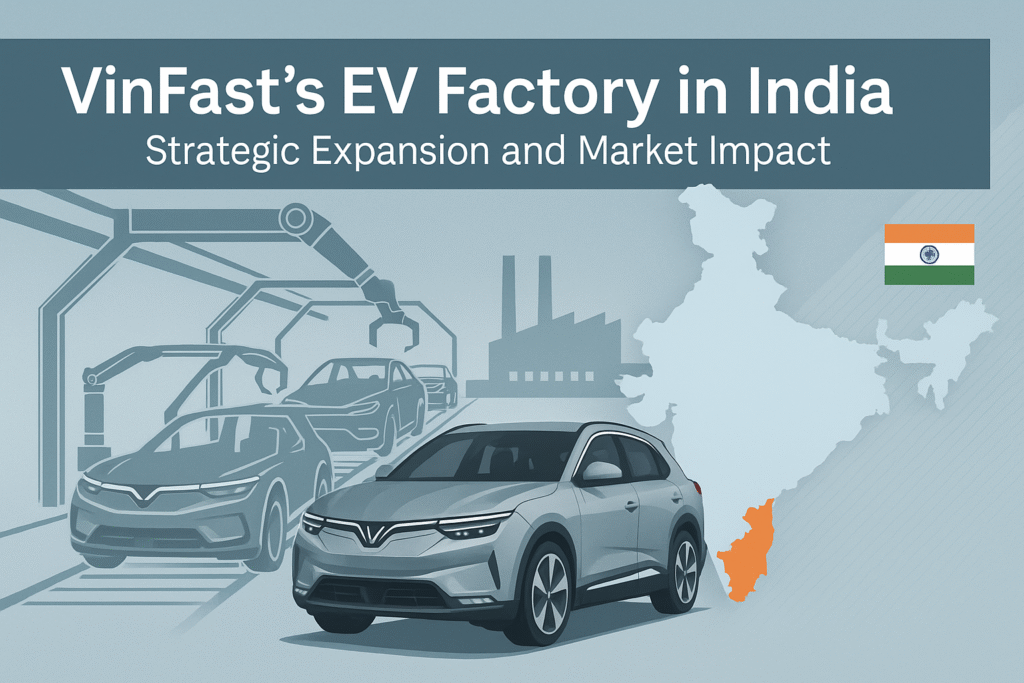
Breaking Ground in Southeast Asia: VinFast’s Strategic Move into Indonesia’s EV Market
Vietnamese electric vehicle (EV) manufacturer VinFast has officially begun construction on its new assembly plant in Subang, West Java, Indonesia. The groundbreaking ceremony, which took place on July 15, 2024, marks a significant milestone in VinFast’s expansion strategy and its commitment to becoming a leading player in the Southeast Asian EV market.
The new facility, located in Subang’s emerging industrial hub, represents an initial investment of approximately $200 million USD. With an annual production capacity of 50,000 vehicles, the plant is scheduled to commence operations in the fourth quarter of 2025. This strategic move aims to bolster VinFast’s presence in the region and support Indonesia’s growing electric vehicle sector.
Key Features of the New Plant
-
Production focus
Right-hand drive versions of VinFast’s e-SUV models, including the VF 3, VF 5, VF 6, and VF 7, specifically for the Indonesian market
-
Facility components
Body Shop, General Assembly Shop, Paint Shop, and testing areas
-
Job creation
Thousands of local employment opportunities
-
Economic impact
Significant contribution to the local economy and promotion of green transportation in Indonesia
The groundbreaking ceremony was attended by notable figures, including Mr. Moeldoko, Chief of Presidential Staff of the Republic of Indonesia, Mr. Ta Van Thong, Vietnamese Ambassador to Indonesia, and Mr. Temmy Wiradjaja, CEO of VinFast Indonesia.
General H. Moeldoko emphasized the positive impact of VinFast’s presence on the regional economy, job creation, and the transfer of technological innovation and knowledge to boost the competitiveness of Indonesia’s automotive industry.
Mr. Temmy Wiradjaja, CEO of VinFast Indonesia, highlighted the significance of this project, stating, “The groundbreaking event, coming just months after VinFast’s official market debut in Indonesia, highlights the company’s strategic expansion and competitive drive in the region, marking a key milestone in our strategy to become a leading player in one of the region’s most promising electric vehicle markets”.
VinFast’s expansion into Indonesia aligns with its global growth strategy. The company has already established a robust business presence in the country, launching two right-hand drive electric SUV models (VF 5 and VF e34), opening dealership stores, and implementing flexible sales policies, including its pioneering battery subscription program.
This new plant in Indonesia adds to VinFast’s existing manufacturing capabilities, which include its state-of-the-art automotive manufacturing complex in Hai Phong, Vietnam, established in 2017. The company has made significant strides since its debut at the 2018 Paris Motor Show, rapidly becoming a leading car manufacturer in Vietnam and expanding its product lineup to include e-scooters and e-buses.
As VinFast continues to innovate and expand its global footprint, the company remains committed to its mission of making EVs accessible to everyone and contributing to a more sustainable future. Despite short-term challenges in the EV industry, VinFast’s investment in Indonesia demonstrates its long-term vision and determination to become a high-tech industrial leader in Southeast Asia with global influence.
However, VinFast will face several challenges in Indonesia. These challenges span across various domains, including infrastructure, labor, regulatory environment, and market dynamics.
Challenges and Considerations
Infrastructure Limitations
Indonesia’s infrastructure, although improving, still presents significant challenges. Issues such as inconsistent electricity supply, limited seaport capacity, and inadequate road and railway connectivity can affect the efficiency of manufacturing operations. Companies may need to invest in additional facilities or account for longer lead times to mitigate these issues.
Labor Market and Skill Gaps
While Indonesia boasts a large and youthful workforce, there is a notable gap in skilled labor, particularly in advanced machinery operation, industrial automation, and quality control. This mismatch between industry needs and available skills can hinder the smooth operation and productivity of the new plant. VinFast will likely need to invest in training and development programs to bridge this gap.
Regulatory and Bureaucratic Hurdles
Navigating Indonesia’s regulatory landscape can be complex due to rapid changes in regulations, inconsistent enforcement, and varying interpretations across regions. The government has made efforts to streamline processes through initiatives like the Omnibus Regulation of 2020, but challenges remain. VinFast will need to ensure compliance with local content requirements, which mandate a certain percentage of locally sourced materials and components, potentially complicating supply chain management.
Supply Chain Disruptions
Global supply chain disruptions, exacerbated by the shift to electric propulsion systems, pose another significant challenge. Shortages of materials and labor, along with the need for timely and clear communication with suppliers, can lead to delays and increased costs. VinFast must establish robust supply chain management practices and possibly partner with experienced contract manufacturers to mitigate these risks.
Cultural and Communication Barriers
Cultural and linguistic differences can lead to misunderstandings and inefficiencies in operations. Effective communication is crucial for smooth collaboration with local suppliers, employees, and regulatory bodies. VinFast will need to invest time and resources in understanding and respecting local customs and business practices to ensure successful integration into the Indonesian market.
Environmental and Sustainability Standards
As global emphasis on environmental sustainability grows, VinFast must ensure that its operations in Indonesia align with high environmental standards. This includes managing waste, reducing emissions, and adhering to local and international environmental regulations. Failure to maintain these standards can lead to reputational damage and legal consequences.
Corruption and Ethical Business Practices
Corruption remains a concern in Indonesia, posing risks to foreign businesses. VinFast must conduct thorough due diligence and uphold strict ethical standards to avoid legal and reputational issues. Establishing transparent and ethical business practices will be crucial for long-term success in the Indonesian market.
Productivity and Efficiency
Indonesia’s manufacturing sector, while cost-competitive, often struggles with lower productivity rates compared to other countries. VinFast will need to implement advanced manufacturing technologies and practices, such as those associated with Industry 4.0, to enhance productivity and maintain competitiveness. This includes leveraging automation, predictive maintenance, and supply chain transparency tools.
Conclusion: A Bold Step Towards Global Leadership
Despite these challenges, VinFast’s strategic investment and commitment to the Indonesian market demonstrate its readiness to tackle these obstacles. By addressing infrastructure limitations, bridging skill gaps, navigating regulatory complexities, and maintaining high ethical and environmental standards, VinFast can establish a successful and sustainable manufacturing presence in Indonesia. The company’s efforts will not only contribute to its growth but also support the development of Indonesia’s burgeoning electric vehicle industry.


